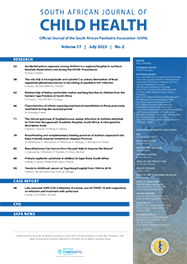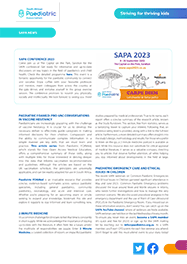Research

Infant feeding practices during the first 6 months of life in a low-income area of the Western Cape Province
Abstract
Background. Exclusive breastfeeding during the first 6 months of life protects against infant morbidity and mortality. Few studies describe the infant feeding practices of mothers living in low-income areas of the Western Cape Province of South Africa (SA).
Objective. To describe the infant feeding practices of mothers of infants younger than 6 months in two low-income communities of SA.
Methods. A cross-sectional community-based study using a structured questionnaire, and seven focus group discussions were conducted from February to August 2011 in Avian Park and Zwelethemba in Worcester, an urban area in the Western Cape.
Results. Seventy-seven per cent of participants (n=108) had initiated breastfeeding. At the time of the study, 6% (n=8) breastfed exclusively. Ninety-four per cent (n=132) applied suboptimal breastfeeding practices: 36% (n=51) breastfed predominantly, 27% (n=38) breastfed partially and 31% (n=43) did not breastfeed. Ninety per cent (n=126) of the mothers had introduced water, of whom 83% (n=104) had done so before their infants were 1 month old. Forty-four per cent (n=61) of the mothers had introduced food or formula milk, of whom 75% (n=46) had done so before their infants were 3 months old. Qualitative findings indicated that gripe water, Lennon’s Behoedmiddel and herbal medicines were also given to infants. Nutritive liquids and/or food most commonly given as supplementary feeds were formula milk and commercial infant cereal.
Conclusion. Exclusive breastfeeding (EBF) during the first 6 months of life was a rare practice in these low-income communities. Water, non-prescription medicines and formula milk and/or food were introduced at an early age.
Authors' affiliations
Charlene Goosen, Division of Human Nutrition, Faculty of Medicine and Health Sciences, Stellenbosch University, Cape Town, South Africa
Milla McLachlan, Division of Human Nutrition, Faculty of Medicine and Health Sciences, Stellenbosch University, Cape Town, South Africa
Claudia Schübl, Division of Human Nutrition, Faculty of Medicine and Health Sciences, Stellenbosch University, Cape Town, South Africa
Full Text
Keywords
Cite this article
Article History
Date published: 2014-04-10
Article Views
Full text views: 1773

.jpg)



Comments on this article
*Read our policy for posting comments here